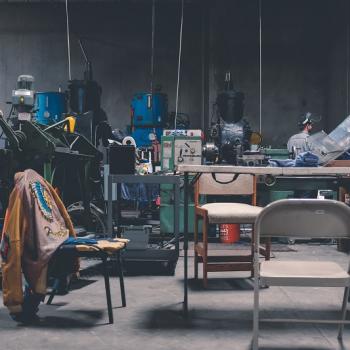
Derek Snook’s social enterprise staffing company, In Every Story, pays higher wages, rewards reliability and hard work, and aims to transition workers to full-time jobs. This post originally appeared at Faith & Leadership.
It’s 5:45 a.m. and still dark in Charleston, South Carolina, darker still in the shadows beneath Interstate 26, the main corridor into the low country’s booming hub. Despite the hour, a steady trickle of commuters is already moving on the freeway. But beneath the overpass, another group of people — one literally passed over — is also headed to work … or so they hope.
Trudging along or pedaling rusty bikes, the men (mostly) and a few women, many of them homeless, are some of the 65,000 South Carolinians who work temporary jobs. As day laborers, they are on the bottom rung of a shaky employment ladder.
Across the country, the typical day-labor story goes like this: show up early; hope for work; take whatever job (roofing, ditch digging, pouring concrete …) is available; work for eight-plus hours; get paid minimum wage — $7.25 an hour in Charleston and most places. Next day, if the job is still available and you’re able (i.e., are sober, not sick, not injured; have child care, have transportation): repeat.
The fringe benefits? None. No sick days, no health insurance, no job security, no way to get ahead.

Grounded in Snook’s faith and built upon his deep understanding of the need for a different kind of day-labor agency, In Every Story pays workers higher wages, rewards reliability and hard work and ultimately aims to transition workers to full-time jobs.
By its very nature, the conventional day-labor market can be exploitative, Snook said, with agencies charging employers at least $13 to $15 an hour and pocketing the difference. Vulnerable and often underpaid, the workers can become trapped in a no-win situation.
Learned the hard way
Despite his college degree and middle-class upbringing, Snook, 29, knows what he’s talking about. He learned the hard way. A few years ago, the Charleston native and preacher’s kid lived in a homeless shelter and worked alongside other shelter residents as one of Charleston’s day laborers.
“Day labor was one of the most miserable and demeaning things I’ve done,” Snook said.
In one particularly grueling assignment, Snook pulled heavy-duty cable all day for $7.25 an hour while a foreman harassed the temp crew.
“To put it in perspective, I lived in the shelter quite happily for a year but only lasted two weeks working day labor,” he said.
The experience led Snook to ask a simple question: What would a staffing agency look like if its goal was to bring heaven closer to earth?
How are you and others “bringing heaven closer to earth”?
From that, Snook began to envision a day-labor company that would help to improve the lives of low-income workers, initially in Charleston and perhaps eventually in cities across the country.
Today, In Every Story (IES) places an average of 70 workers a day in temporary jobs in construction, landscaping and tourism/hospitality industries. Like day laborers everywhere, the people who come to IES looking for work typically face barriers to employment in other settings. Some are homeless, lack transportation, have limited education or a criminal record or history of substance abuse, or perhaps a mix of any or all of the above.

The company also gives workers a chance to share in the profits. After being on the payroll for 150 hours, workers can earn a share of 10 percent of the company’s profits, with the share increasing each month that the worker clocks in at least 150 hours. After the fourth month, the worker also receives an additional $150 bonus.
The bottom line: after four months, workers can earn about 31 percent more than they would have earned at minimum wage, Snook said.
The goal is not only to help employees “live their best story” with sustainable wages and a shot at full-time employment but also to elevate the day-labor industry more broadly, Snook said.
“We want to create a better business model for day labor,” Snook said.
The plot unfolds
The plot of In Every Story unfolded in tandem with Snook’s own winding spiritual and professional journey. After graduating from Furman University in 2008, Snook taught school in East Africa for several months and applied to graduate school in history.
Anxiously waiting to hear from the Ph.D. programs, not knowing what the future might hold, he made a promise one day that has steered his course ever since.
“I sat in the back of a fourth-grade classroom in Kenya and told God that if he gave me something meaningful and purposeful to do with my life, I wouldn’t quit unless it was complete or he said it was time to quit,” Snook said.
Whatever that “something” might be, a series of rejection letters soon let him know that it wasn’t going to be graduate school.

Having previously volunteered at the mission, Snook felt called not only to go back there and be of service but also to understand what it felt like to live on the margins of society. He wanted to figure out how to bridge a gap that he had observed back in Africa.
“In Africa, I realized there was often a disconnect between those who wanted to help, those who really understood how to help and those on the receiving end,” he said. The only way he thought he could find a solution was to get as close as he could to “those on the receiving end.”
“If, as a Christian, I believe that Christ came to insert himself in my shoes, then I should be willing to do that with others,” Snook said. “I wanted to grind my faith against action and see what would happen.”
For Snook, empathy is a starting point for understanding another’s story and all the conflicts and obstacles it contains.
It’s one thing, however, to talk about empathy and understanding. It’s quite another to live with 26 men in one large room and earn $7.25 an hour doing hard, physical labor.
“I moved into the Star Gospel Mission without knowing where it might lead,” Snook said. “I was clueless and often afraid, depressed and lonely. But that’s the thing about faith — it requires going in blindly.”
Living day after day in the mission, Snook began to see, hear and understand the stories of his shelter buddies and the conflicts and obstacles they faced. One of those obstacles, he soon realized, was the day-labor market and the way it kept workers from ever getting ahead.
That, he decided, was an obstacle he could address.












